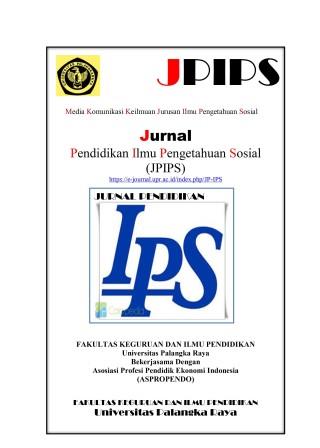Civil Islam Movement is Responding to Environmental Degree Yogyakarta City (Study: Environmental Council For Muhammadiyah Regilonal Leadership in Yogyakarta
DOI:
https://doi.org/10.37304/jpips.v14i1.4737Keywords:
Civil Islam, Existence Muhammdiyah, EnvironmentAbstract
The purpose of this study is to examine the ideology that underlies the birth and development of the Muhammadiyah environmental movement and its relationship with the MLH PDM Yogyakarta City, strategies for achieving the movement's goals, and its contribution to improving the environmental quality of Yogyakarta City. This research was conducted using a qualitative case study method with primary and secondary data obtained from interviews, documentation, and observation. Meanwhile, the concepts used to analyze the data are Herbert Blumer's Symbolic Interactionism theory, the environmental movement and the Ecological Ethics of Islamic Pantheism, and civil society. The results showed that the environmental movement by MLH PDM Yogyakarta City was related to the MLH PPM movement or the Muhammadiyah environmental movement in general as a representation of Islamic-based civil society. In particular, the environmental movement MLH PDM Yogyakarta City is assessed from the commitment of its members in implementing the program from MLH PPM and the efforts taken to optimize program implementation through; (1) transfer of knowledge about environmental issues to external parties, (2) framing environmental issues through journalism activities, (3) innovation in the Shodaqoh Waste program, (4) collaboration with internal and external Muhammadiyah institutions, (5) holding periodic forums in the form of internal meetings, and (6) make plans to implement the Rainwater Harvesting movement in the PDM environment of Yogyakarta City. Meanwhile, in general, the Muhammadiyah environmental movement contributes to the improvement of the environment and economic, socio-cultural, and political aspects, especially in public policy
Downloads
References
Aditjonoro, G. J. (2003). Pola - Pola Gerakan Lingkungan: Refleksi Untuk Menyelamatkan Lingkungan Dari Ekspansi Modal. Yogyakarta: Pustaka Pelajar.
Amri, E. (2016). Pola Hubungan Negara dan Civil Society. Jurnal Kajian Politik Dan Masalah Pembangunan, Vol 12(No 2), 1821–1828.
Arizona, Y. (2017). Jihad Berkonstitusi: Muhammadiyah dan Perjuangan Konstitusional Melawan Komodifikasi Air. Jurnal Wacana, Vol 11(No 2), 84–91.
Azca. (2019). Dua Menyemai Damai: Peran dan Kontribusi Muhammadiyah dan Nahdlatul Ulama dalam Perdamaian dan Demokrasi. Yogyakarta: Pusat Studi Keamanan dan Perdamaian Universitas Gadjah Mada.
Fajarwati, A. (2015). Kajian Program Pengelolaan Sampah Rumah Tangga Mandiri (Bank Sampah) Berbasis Masyarakat Di Kota Yogyakarta. Jurnal Bumi Indonesia.
Hamdi, R. A.-. (2019). Politik Inklusif Muhammadiyah: Narasi Penceahan Islam untuk Indonesia Berkemajuan. Yogyakarta: UMY Press.
Jihan, M. (2015). Muhammadiyah Studies: Transformasi Kajian Tentang Gerakan Islam di Indonesia. Analisa Jurnal of Social Science And Religion, Vol 22(No 2).
Mulasari, S. A. (2016). Kebijakan Pemerintah Dalam Pengelolaan Sampah Domestik. Jurnal Kesehatan Masyarakat, Vol 11(No 2), 96–106.
Puspita, K. M. (2013). Analisis Peran Gerakan Kampung Hijau sebagai Upaya Pengelolaan di Kelurahan Rawajati Kecamatan Pancoran Jakarta Selatan. Jurnal Ruang Perencanaan Wilayah, Vol 1(No 1), 71–80.
Sari, D. K. (2015). Gerakan Sosial Baru di Ruang Publik Virtual pada Kasus Satinah. Jurnal Ilmu Komunikasi, Vol 12(No 1), 105–118.
Sudibyo, G. A. (2013). Perancangan Iklan Layanan Masyarakat Program Green Jihad untuk Remaja di Kota Solo. Jurnal Desain Komunikasi Visual Adiwarn.
Sulistyaningsih. (2015). Respon Masyarakat Desa Sitimulyo Terhadap Pengelolaan Tempat Pembuangan Akhir Sampah (TPA) Piyungan Bantul. Jurnal Sosiologi Reflektif, Vol 9(No 2), 49–77.
Thorik, M. J. (2015). Aksi Kolektif Dalam Bersepeda: Studi Banding Atas Sego Segewe (Sepeda Kanggo Sekolah Ian Nyambut Gawe). Jurnal Sosiologi Reflektif, Vol 9(No 2), 247–272.














